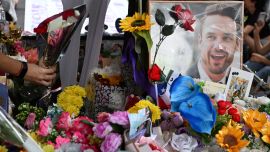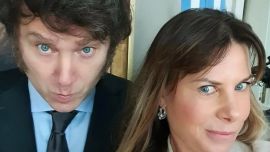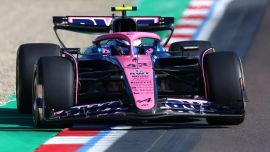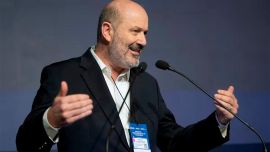With a death toll of over 300,000 between soldiers and the civilian population, Russia’s invasion of Ukraine and the continuing conflict has triggered economic, political and social repercussions in the rest of the world.
Since its start a year ago yesterday, President Alberto Fernández’s government has fluctuated between various stances regarding the conflict and its protagonists, Vladimir Putin and Volodymyr Zelenskyy.
On February 24, 2022, presidential spokesperson Gabriela Cerruti, acting on Foreign Ministry instructions, issued the first statement of the Fernández administration on Putin’s advance into Ukrainian soil. She did so without speaking of an invasion, urging "prudence" over the issue and calling on Russia "to cease its military actions in Ukraine."
The remarks came only three weeks after Fernández visited Putin in Russia where he pledged to boost relations between his giant host and Latin America.
"Argentina has to be Russia’s gateway into Latin America," he said on February 3 last year in the Kremlin where the two presidents committed themselves to "advancing" in an integral strategic association agreement between both countries.
But later that month, with Russian troops invading their neighbour, Cerruti expressed: "Argentina, true to the most essential principles of international co-existence, most firmly rejects the use of armed force and profoundly regrets the escalation of the situation in Ukraine."
Hours later, in the same tone, the president sent a "call to all sides not to use military force," demanding that the Russian Federation "halt the actions undertaken and that all the sides involved return to the table of dialogue." Via a brief tweet, Fernández deplored the "escalation of the war," assuring that the Foreign Ministry was working on assisting Argentines in Ukraine.
His words caused a considerable uproar among the opposition, which questioned the president for not firmly condemning Russia and avoiding the word “invasion.”
Former president Mauricio Macri, his predecessor in office, even proposed that Argentina should accompany the international sanctions and annul all military agreements signed with Putin.
A shift
Two days later on February 26, Foreign Minister Santiago Cafiero, appearing before the Human Rights Council of the United Nations, used for the first time the words "condemn" and "invasion" to refer to the war between Russia and Ukraine.
"The world must not tolerate more suffering and death," expressed the minister, adding: “Argentina repeats its call to the Russian Federation to immediately cease its use of force, condemning the invasion of Ukraine and the military operations in its territory.”
Along the same lines, he continued: “Resorting to the use of force and violating the territorial integrity of another state is not a legitimate way of resolving a conflict. Preventive wars should be condemned because they are illicit when diplomacy is available for discussion. The world must not tolerate more suffering and death. Peace is urgent and dialogue must start now.”
Consulted over his tougher stance, Cafiero explained in radio statements at the time that the government was "consistent with its traditions," explaining that "when the tension started, Argentina raised the need to defuse the conflict so as not to go to war."
But beyond the change in discourse, Argentina, along with Brazil, did not back in the Organisation of American States (OAS) a statement aimed at condemning the Russian invasion of Ukraine, despite the support of 24 countries in the framework of an extraordinary session in which both Moscow and Kyiv participated as permanent observers.
During that day, the Ukrainian Ambassador to Washington Oksana Markarova called for heavy sanctions against Russia while asking the OAS to eliminate their status as a permanent observer.
Argentina’s argument was that pronouncing on the invasion went beyond the scope of the OAS. Less than a month later, on April 21, the OAS resolved to suspend Russia as a permanent observer despite the Argentine government’s abstention in the voting.
Anti-sanctions
On more than one occasion, President Fernández showed himself against economic sanctions against countries, not only using Russia as his example but questioning the historic blockade against Cuba and the reprisals against Venezuela to punish the Nicolás Maduro administration.
"There is a negative fallout in the rest of the world,” he argued from Berlín, when standing next to German Chancellor Olaf Scholz in the midst of a European swing starting on May 10 in Madrid and culminating with his visit to France.
He further assured that "Argentina would not be sending arms to anybody so that nobody else dies,” regarding the military assistance of NATO countries and allies for Ukraine.
On June 27, when addressing the G7 in the Bavarian Alps, he publicly condemned the Russian invasion of Ukraine, proposing to open a channel of dialogue to end the war in Europe.
“We need to push the dialogue between the parties involved. History shows that every conflict ended with agreements on the basis of concrete initiatives. We are already taking that initiative in search of peace. Let’s do it before it’s too late.”
Some days later, on July 1, he made his first telephone call to President Zelenskyy lasting 35 minutes, in which he manifested Argentina’s support "for all negotiations undertaken for the cessation of hostilities.”
Putin calls
Some months later, with a firmer posture than his initial oscillations, Argentina voted early in October in favour of a UN General Assembly resolution to condemn the Russian bid to annex Ukrainian territories, also rejecting the referenda in the Ukrainian oblasts of Donetsk, Luhansk, Kherson and Zaporizhzhia.
Invited by French President Emmanuel Macron to the Paris Peace Forum on November 11, Fernández proposed that the Southern Hemisphere promote Russia and Ukraine returning to dialogue to bring the conflict to an end. While avoiding mention of Putin, he repeated his condemnation of the war: “We have the ethical imperative not to hold our peace.”
In late December after Argentina’s triumph in the Qatar 2022 World Cup, the Russian president telephoned his peer to congratulate him on the sporting feat and if in the first instance it was leaked that their conversation was only about football, Fernández himself recognised that the invasion also entered their exchange of views.
"President Putin asked me why we did not resume our dialogue. I told him that I was always ready but that I saw an inconvenience, which was the problem of the war,” revealed the President about their December 19 communication.
Two days later Cafiero was on the telephone to his Russian counterpart Sergei Lavrov, in which he reiterated the possibility of advancing in the mechanisms to permit an end to the conflict.
This year began with the Summit of the Community of Latin American and Caribbean States (CELAC in its Spanish acronym), presided by Argentina and with the presidents or representatives of the 33 member countries in attendance, when the war occupied a central place in discussions.
Last weekend the Foreign Office informed that ACIAH (Agencia Argentina de Cooperación Internacional y Asistencia Humanitaria), better known as the White Helmets, had sent its 18th cargo of donations to Ukrainians affected by the invasion.
Anniversary arrives
Marking a year since Russia's invasion, the Foreign Ministry on Friday called on both sides of the conflict to head to the negotiating table and call an immediate ceasefire.
"Argentina reaffirms its commitment to the principles of sovereignty and territorial integrity of states and human rights, permanent pillars of our country's foreign policy," read a statement issued by the portfolio. "It rejects the use of force as a mechanism to resolve conflicts and, in this way, reiterates its condemnation of Russia's invasion of Ukrainian territory.
Foreign Minister Santiago Cafiero will on Friday receive Yuriy Klymenko, Ukraine's new ambassador to Argentina, and receive his credentials. The appointment coincides with the anniversary of the war.
President Alberto Fernández's government also expressed its concern following Putin's announcement that Russia would suspend its participation in a bilateral nuclear disarmament agreement it has with the United States. In Argentina's view, this "further increases the danger of a new escalation."
"We are facing a scenario that threatens our security and our common welfare. For this reason, the Argentine Republic calls for the avoidance of any action that could endanger nuclear facilities or facilities with radioactive material and expose the population to a future that is difficult to imagine," said the Foreign Ministry in its statement.
"We call on all parties involved to de-escalate the conflict; the politics of escalation only presages destruction. Dialogue is the only way forward. The world cannot bear any more suffering and must not tolerate any more deaths. Peace is urgent," the document concludes.
– TIMES/NA





















Comments